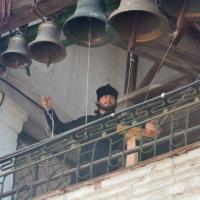By the time of Borodin’s death in 1887, the opera Prince Igor, the major musical project of his life, was still incomplete, perhaps not surprisingly, since Borodin was a research chemist by profession who only composed in his spare time. Like those epic storytellers of the past who left their legacy in the hands of oral tradition, he had left sufficient indications for his close friends Rimsky-Korsakov and Glazunov to stitch Prince Igor together, though it was only thanks to Korsakov’s persistent encouragement during Borodin’s lifetime that they had enough raw material to work on.
It all began nearly 18 years earlier in April 1869 when Vladimir Stasov, the critical conscience of the circle of Russian nationalist composers to which Borodin belonged, along with Korsakov, Mussorgsky, Cesar Cui and the founder member Mily Balakirev, supplied Borodin with a detailed operatic scenario based on the ancient manuscript of the 12th-century epic poem The Lay of Igor’s Campaign. The poem’s date is generally accepted as being between 1185, the year of Prince Igor Svyatoslavovich of Novgorod-Seversk’s raid on the Polovtsian tribe in the southern steppes, and 1187 (Igor died in 1202). It is a short text, no Iliad in length, and deals simply with the solar eclipse spelling doom on Igor’s campaign, a three-day battle resulting in Igor’s defeat (completely omitted in the opera), his escape from captivity under the Polovtsian leader Khan Konchak and his return to wife and people.
Borodin started proper work on Prince Igor in 1874, and it joined other fragments in the pioneering series of concerts at the St Petersburg Free Music School. In 1876 the public first heard the ‘Glory!’ chorus of the opening prologue, and the Polovtsian Dances were among the numbers promised for another of the concerts later that year. As the orchestration of the Dances was far from ready, Rimsky-Korsakov and his normally indolent pupil Anatoly Lyadov worked on it at white heat late into the night. As Rimsky later wrote in his wonderful autobiography My Musical Life,
The finished version of the score Borodin covered with liquid gelatine, to keep our pencil marks intact; and in order to have the sheets dry the sooner, he hung them out like washing on lines in my study. Thus the number was ready and passed on to the copyist.
Despite the piecemeal nature of the work during and after Borodin’s death, Prince Igor works as an honourable specimen of the Russian epic opera. The music exhibits dramatic contrasts between the Orthodox choruses and folk song of the proto-Russian people and the exotic celebrations of the Polovtsian Khan Konchak’s retinue while Igor and his son are held prisoner.
The style is a curious melange, though all the themes are melodically inspired. Borodin consulted an expert on what sort of music these nomads of the southern steppes would produce, and the answer was a mix of Turkic style with Magyar folk music later to be collected together by Bartok (part of ancient Polovtsia extended into Hungary).
The divertissement begins with a flowing maidens’ dance, its sinuous theme further immortalised as ‘Stranger in Paradise’ in the musical Kismet (no shame in that, for Borodin was Tchaikovsky’s equal as the supreme Russian melodist). A ‘wild men’s dance’ with flamboyant clarinet whirls follows, succeeded by a ‘general dance’ with 3/4 leaps praising the Khan. Young men spin and leapwhirl in a mysterious Presto, interwoven with a return of the women’s melody and the wild men’s strains, and culminating in a final blazing celebration of Konchak’s might.
Composer: Borodin Wiki Link: http://en.wikipedia.org/wiki/Polovtsian_Dances Title of Musical Work: Polovtsian Dances